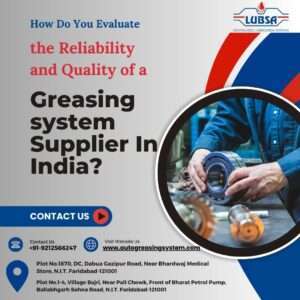How Do You Evaluate the Reliability and Quality of a Greasing System Supplier In India?

Choosing a dependable and high-quality grease system provider in India is an important decision for a variety of sectors, including industrial, automotive, and agricultural, where effective lubrication systems are essential for equipment performance and lifetime.
A bad decision in this area might result in operational interruptions, increased maintenance expenses, and even safety risks. As a result, determining the dependability and quality of a grease system provider is important.
We will go over the major variables to consider while evaluating Grease Lubrication System Manufacturer In India, with an emphasis on key factors that should drive your decision-making process.
Experience and reputation
A Greasing System Supplier In India reputation and experience are frequently the first signs of dependability and quality. A reputable provider is more likely to deliver trustworthy goods and services. To assess this aspect:
Examine the supplier’s background and track record. What major projects have they worked on, and how long have they been in the industry? Look for customer feedback, testimonials, and references. Previous client feedback might provide useful information about the supplier’s performance and dependability.
Product range and quality
A significant factor is the quality of the grease systems provided by a provider. Different sectors have different requirements; therefore, it’s essential to be sure the supplier can supply solutions that fit your unique specifications. To assess the quality and range of products:
Examine their greaser system specifications and features. Are they intended to fulfill industry standards and performance targets? Inquire about customized possibilities. Can the provider adjust their items to your specific application and needs? Examine the product selection. A varied product portfolio demonstrates the supplier’s capacity to meet a variety of needs and may also reflect a continual commitment to innovation.
Technical Support and Support
Because greaser systems frequently require specific knowledge for installation, maintenance, and troubleshooting, technical skills and support are essential. To evaluate the technical competence of the supplier:
Inquire about the technical staff’s qualifications. Are they properly trained and skilled in the field of grease system technology? Inquire about the availability of technical assistance, both during the installation process and during the system’s life cycle. Examine the supplier’s capacity to provide training and documentation for your employees to ensure the appropriate operation and maintenance of the greasing systems.
Compliance with Standards
When assessing a greasing system provider, compliance with applicable industry standards and certifications is important. It guarantees that the items fulfill the necessary safety and performance standards. To evaluate this aspect:
Examine if the supplier’s lubrication systems comply with industry norms and regulations, such as those established by the International Norms Organization (ISO). Check to see if the supplier has the necessary certifications, such as ISO 9001 for quality management systems. Ascertain that the items have safety features and fulfill the appropriate environmental and occupational health requirements.
Service and maintenance after the sale
After-sales support and maintenance services are essential for greaser systems long-term dependability and performance. To assess the supplier’s dedication to after-sales services:
Inquire about the availability of maintenance and servicing contracts. Evaluate their reaction time in the event of an emergency or a breakdown. Examine their spare parts availability and lead times to ensure that component replacement causes as little downtime as possible.
Price and ownership cost
While the cost of the leasing system is essential, the entire cost of ownership must also be considered. If it results in lower operational expenses and greater system dependability, a little larger initial expenditure may be justified. To assess the cost aspect:
Compare the purchase price to the anticipated long-term maintenance and operational expenditures. Consider the maintenance and downtime savings that a higher-quality system may provide. Request from the supplier a full cost analysis, including the return on investment throughout the system’s estimated lifespan.
Local Support and Availability
Local support and product availability are major concerns, especially in India, where regional inequalities and logistics might interfere with timely delivery and assistance. To evaluate this aspect:
Confirm the presence of the provider in your area. Is there a local office, a dealer, or a service center? Inquire about their capacity to provide on-site support and timely delivery. Examine their inventory management to guarantee that spare parts and replacements are available when needed.
Considerations for the Environment
It is important in today’s ecologically concerned society to evaluate the sustainability and environmental effects of the grease systems given. To assess this aspect:
Inquire about the supplier’s dedication to environmentally friendly practices, such as the use of biodegradable lubricants or energy-efficient designs. Examine their adherence to environmental standards and attempts to lessen their carbon impact.
Long-Term Sustainability
The long-term sustainability of a Grease Lubrication Pump Exporter is an often-overlooked but essential consideration to consider. It guarantees that the provider will be accessible to support your systems for the duration of their estimated life. To determine long-term viability:
Examine the supplier’s financial stability and potential for expansion. Look at their client retention rate, since a high number implies customer happiness and long-term dedication. To stay relevant in the industry, inquire about their future product development and technological strategy.
Conclusion
Choosing a dependable and high-quality Greasing System Supplier in India is a multifaceted task that requires weighing several factors, including reputation, product quality, technical expertise, standard compliance, after-sales support, cost, local availability, environmental considerations, and long-term viability.
You may make an educated choice about the functioning and lifetime of your greaser systems by properly considering these parameters. Remember that a well-chosen supplier is an investment in the efficiency and dependability of your equipment, which may lead to increased production and lower operational expenses in the long run.
